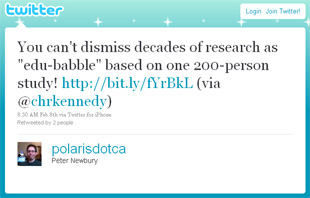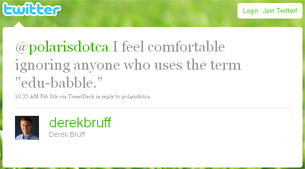First, a disclosure: I’d love to pepper this posting with links to journal articles here, there and everywhere. But the truth is, if I try to do that, I’ll never get it written. If only I had a massive library of refs in my head like some of my colleagues. So here goes the “I’ll add refs later” version.
On February 8, the Vancouver Sun published a column by Michael Zwaagstra entitled “Purdue University study confronts edu-babble” (Hat-tip to @chrkennedy.)
<raised>hackles</raised>
The lead paragraph concludes
Instead of telling students what they need to learn, teachers should encourage them to construct their own understanding of the world around them. The progressive approach to education is far more useful to students than the mindless regurgitation of mere facts.”
A reasonable philosophy. One I agree with, in fact. And no, I didn’t forget to copy the opening quotation mark. It was omitted. Maybe that’s Vancouver Sun style. Or maybe it’s to hide the fact that this paragraph is a strawman about to knocked down by the author, who begins his actual column with
“Anyone involved in education knows these types of edu-babble statements are often heard in teacher-training institutions. Education professors continually push teachers to move away from traditional methods of instruction.”
The author goes on to cite a new study in Sciencexpress (20 Jan 2011) Science (11 Feb 2011) by Jeffrey D. Karpicke and Janell R. Blunt, “Retrieval Practice Produces More Learning than Elaborative Studying with Concept Mapping.” Let me describe that research first and then come back to how Zwaagstra presented it.
Karpicke and Blunt did quite a nice study comparing, among other things, the final test scores of four groups of students
- study-once: students studied the text in 1 study session
- repeated study: students studied the text in 4 consecutive study session
- elaborative studying with concept mapping: after instruction on how to create a concept map, students created concepts maps of the concepts in the text. This activity plays the role of “constructing their own knowledge” in the journal article and Zwaagstra’s newspaper column.
- retrieval practice: students studied the text in one study session, then practiced retrieval by trying to recall as much as they could. Then they restudied and recalled a second time. The authors made sure the students in this group and the concept mapping group had the same time-on-task.
When these learning activities were complete, all students wrote the same short-answer test which contained both “verbatim” questions testing knowledge stated in the text and “inference” questions that required students to assemble various facts. For both types of questions, the retrieval practice group scored the highest, followed by the repeated study, concept mapping and study once groups. In both types of questions, the retrieval practice scores were statistically significantly higher than other scores. The article goes on to describe how they replicated the study, with similar results.
Hmm, interesting result. I wonder… no, sorry, back to the Vancouver Sun article.
Fine. Studying helps students succeed on tests.No one would argue against that. And concept mapping certainly has its strengths but it is just one approach to “constructing your own understanding.”
Zwaagstra uses the Purdue result to support the practice of testing students regularly on content knowledge. No problem with that. And that Provinces which are abandoning standardized testing are falling prey to “anti-testing mantra”. Hmm, not sure about that. And that learner-centered instruction is “edu-babble”. Okay, that pissed me off:
I’m relieved to say I wasn’t the only one, based on the handful of RTs and replies I received from @cpm5280, @mcshanahan, @ScientificChick, @chrkennedy, @sparkandco and @derekbruff, all tweeps whose opinions I value.
Right – everyone is entitled to their opinion. Zwaagstra is sharing his, just like I’m sharing mine. But wait, this isn’t an opinion piece – it’s a newspaper report:
Well, in fact, a friend tells me the online Vancouver Sun just tacks “Vancouver Sun” credentials onto the author. At the bottom of the article, we discover Mr. Zwaagstra is a research fellow with the Frontier Centre for Public Policy, a “think-tank” [their quotes] supporting Canada’s prairie provinces. So this is not an objective piece of journalism about new result in education research. It’s an opinion piece written on behalf of the Frontier Centre to support their philosophy. The Vancouver Sun should have made that a lot clearer. And did they really have to use the most sensational word in the entire story, “edu-babble”, in the headline? How about a little less tabloid next time, huh? In hindsight, maybe that pissed me off just as much as Zwaagstra’s lampooning of decades of education research and practice.
So, I’ll stay vigilante to stories which misrepresent science. But in the end, I’ll also follow Derek Bruff’s advice:




Great to read more of your thoughts on this! And thanks for looking into the author’s position – that’s a really good know. Kind of puts it in perspective.
The closing tweet quote is perfect! :)
What if Zwaagstra had been writing about medicine?
“Anyone involved in MEDICINE knows these types of EVIDENCE-BASED-babble statements are often heard in MEDICAL SCHOOLS. MEDICAL professors continually push DOCTORS to move away from traditional methods of DIAGNOSIS AND PATIENT CARE.”
In other words, we should break out the leeches.
Regarding the study in question, I wonder how the students would do with *long term* retention. I know plenty of calculus students who memorize “recipes” and do well on tests, yet can’t transfer that knowledge to subsequent courses. Those with conceptual understanding of those “recipes,” however, seem to have a much easier time leveraging their calculus skills down the road.
Thanks for that great comment, Derek. Your small change, swapping medicine for education, highlights Zwaagstra’s opinion of research-based instructional strategies for promoting active learning, an opinion I shall continue to disagree with.
As a highschool math teacher I favor the spoon-feeding of information as a primary delivery of the curriculum, which builds confidence. The confident child can then relax long enough to engage higher level thinking and blossom.
Thanks for this post, Pete. I came here following a lead I found when searching for “Zwaagstra”. His latest broadside for math teachers (my field) got me mad in its dismissal of decades of considered research in math ed, and its unquestioning support for “traditional” methods of math education.
It helps to see that this is a bit of a trend for Mr Zwaagstra, and that I am in good company to question his assumptions and conclusions. Thanks again.
Thanks for the comment, Peter. If that Zwaagstra math piece made you mad, you might be interested in this analysis and rebuttal by my friend, David Wees (@davidwees on Twitter):
http://davidwees.com/content/new-math-equals-trouble-education-expert-says